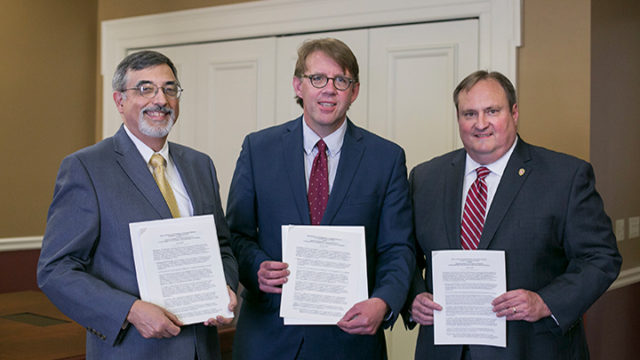
On June 16, 2017, the University of Wisconsin School of Pharmacy, the American Institute of the History of Pharmacy (AIHP), and the Wisconsin Historical Society (WHS) signed an updated Memorandum of Understanding (MOU) that pledges all three institutions to continue working together to preserve the history of American pharmacy. The MOU built on previous agreements from 1960 and 1970 and was signed by UW School of Pharmacy Dean Steven Swanson, AIHP Executive Director Gregory Higby, and WHS State Archivist Matthew Blessing. For more than a century, these three institutions have made Madison, Wisconsin, the premier location for the study of the history of pharmacy, and this renewed agreement confirms and builds on this legacy.
The long-standing and collaborative relationships between the UW School of Pharmacy, AIHP, and the Wisconsin Historical Society are confirmed and renewed in the updated Memorandum of Understanding. The MOU re-affirms that these three institutions “share a common goal of preserving documents, manuscripts, photos, and artifacts related to the history of pharmacy, medicines, and pharmaceutical sciences.”
The UW School of Pharmacy’s commitment to the history of pharmacy began in the late nineteenth century with the pedagogical philosophy of Edward Kremers, the School of Pharmacy’s second Director (1892-1935). A strong believer in the benefits of a well-rounded liberal arts education, Kremers wrote in 1892 that “the needs of pharmacy lie in a more thorough and broader education,” and he argued that, in addition to the “natural sciences,” pharmacy students “should at least have a fair knowledge of the history of [their] profession. Both, I dare say,” he concluded, “are equally important in the symmetric development of a scholar.” In the early twentieth century, Kremers began offering instruction in the history of pharmacy, and the University of Wisconsin School of Pharmacy continues to offer an elective course on the topic. Kremers also researched and corresponded broadly about the history and the practice of pharmacy, and his personal research collection is the centerpiece of the Kremers Reference Files, the on-site historical and archival collection maintained by the UW School of Pharmacy and the American Institute of the History of Pharmacy.
The Wisconsin Historical Society’s involvement with the history of pharmacy dates to 1912 and the creation of the “Hollister Pharmaceutical Fund” by the will of Kittie E.V. Hollister. This bequest to the WHS, in honor of her husband Albert H. Hollister, a prominent Madison pharmacist, called for “the establishment in its library of a collection or department of pharmaceutical literature.” Since 1912, the Hollister Fund has supported the purchase of books, as well as research into the history of pharmacy at the WHS.
On January 22, 1941, in a classroom at the University of Wisconsin School of Pharmacy, six men, including UW School of Pharmacy Director Emeritus Edward Kremers and his successor, Dean Arthur Uhl (1935-1968), met to found the American Institute of the History of Pharmacy. AIHP’s founding Director, George Urdang, the former Director of the German Society of the History of Pharmacy and a refugee from Nazi Germany, was also in attendance at the inaugural meeting. In Madison, Kremers and Urdang had collaborated on Kremers and Urdang’s History of Pharmacy, the first textbook of its kind in the United States, and, after being hired as a professor at the UW School of Pharmacy, Urdang also established the first American graduate program in the history of pharmacy. During these years, Urdang eloquently explained AIHP’s purpose: “The aim of the American Institute of the History of Pharmacy is to equip pharmacists for citizenship in the world of intellectual and moral responsibility by making them familiar with the non-technical aspects and humanistic ramifications of the profession.” Since AIHP’s founding in 1941, the University of Wisconsin School of Pharmacy has strongly supported and facilitated the Institute and its mission.
In 1960, AIHP, acting as the representative of the UW School of Pharmacy, and the Wisconsin Historical Society established an agreement to confer about expenditures related to the Hollister Fund. Ten years later, the American Institute of the History of Pharmacy and the WHS strengthened their cooperation, when, under the direction of then AIHP Executive Director Glenn Sonnedecker, the Institute deposited nearly two dozen historically significant manuscript collections at the Archives of the Wisconsin Historical Society. The AIHP archival collections include records from important organizations like the American Association of Colleges of Pharmacy, the United States Pharmacopeia, and the National Association of Boards of Pharmacy, as well as collections from prominent individuals like Rufus Lyman, the founding editor of the American Journal of Pharmaceutical Education.
The recently signed MOU establishes formal structures for “consultation regarding the use of the Hollister Fund” and for the identification of “areas of mutual interest and potential collaboration such as conferences, workshops, publications, exhibits, and related projects.” The agreement recognizes that the UW School of Pharmacy, AIHP, and the WHS all understand “the importance of developing a long-term strategy to ensure” the maintenance of existing collections and promises future “collaboration to expand the collections related to the history of pharmacy.”
The MOU also creates a new “Working Group on the History of Pharmacy, Medicines, and Pharmaceutical Sciences” to facilitate the implementation of the agreement. The Working Group, composed of representatives from the UW School of Pharmacy, AIHP, and WHS, will meet at least once per year “to review the previous year’s projects, plan for future projects, and to consider possible support from the Hollister Endowment.”
The updated and newly signed Memorandum of Understanding re-confirms the commitment of the University of Wisconsin School of Pharmacy, the American Institute of the History of Pharmacy, and the Wisconsin Historical Society to the preservation and dissemination of pharmacy’s fascinating history and maintains Madison’s position as the most important location for the understanding, interpretation, and analysis of the history of pharmacy.